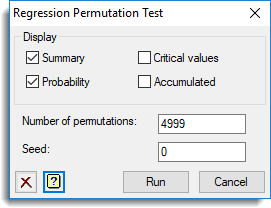Use this to perform random permutation tests for a regression model.
This dialog is opened from the Linear Regression dialog after running an analysis, clicking the Further output button then clicking Permutation test.

Random permutation tests provide an alternative to using the F probabilities, printed for variance ratios in summary or accumulated analysis of variance tables, when the assumptions of the analysis are not satisfied for linear models. These assumptions can be assessed by studying the residual plots. In particular, the use of the F distribution to calculate the probabilities is based on the assumption that the residuals from each stratum have Normal distributions with equal variances, and so the histogram of residuals should look reasonably close to the Normal, bell-shaped curve.
Experience shows the analysis is robust to small departures from Normality. This method can be useful if the histogram looks very non-Normal. This menu can also be used to generate probabilities for deviances or deviance ratios in generalized linear models, instead of using the customary chi-square or F distributions (which are justified by asymptotic theory).
Display
Specifies which items of output are to be displayed in the Output window.
| Summary | Displays a summary-of-analysis table with the usual probability for the regression model replaced by the probability from the permutation test |
| Probability | The probability for the whole regression model |
| Critical values | To accompany the summary or accumulated tables by a table giving estimated critical values for each of the statistics |
| Accumulated | Accumulated analysis of variance or deviance table with the usual probabilities replaced by those from the permutation test |
Number of permutations
This options specifies the number of permutations, default 999 (as well as the “null” permutation where the data keep their original order). If this number exceeds the maximum possible number of permutations for the data, an “exact” test is performed in which every permutation is used once. This is feasible only for small datasets. There are n! (n factorial) permutations of n units: 3!=6, 4!=24, 5!=120, 6!=720, 7!=5040, 8!=40320, and so on.
Seed
Specifies the seed for the random number generator used to make the permutations; default 0 continues from the previous generation or (if none) initializes the seed automatically.
Action buttons
| Run | Click Run to perform the permutation test. |
| Cancel | Close this dialog with no further action. |
See also
- RPERMTEST procedure for permutation tests for regression models